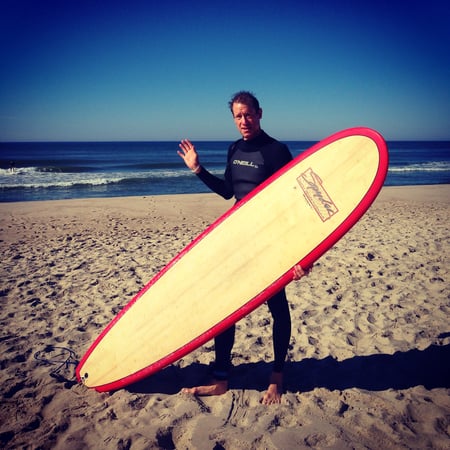Happiness and the Secret to Lifetime Satisfaction
July 5th, 2022
4 min read

I’ve been obsessively thinking about happiness over the past few months. How is it that in a time of much abundance, so many people are unhappy? Why do people constantly want more? Is there a “secret” to happiness?
Gallup recently released their annual Global Emotions Report, measuring people's positive and negative experiences. “In 2021, people worldwide felt more worried, stressed and sad than at any time in the past 16 years.” the report says. “They also had fewer positive experiences than they did in 2020. And 28% of people said they experienced a lot of sadness the previous day, the highest percentage ever recorded.”
What’s going on?
Over the past few weeks, I’ve surfed nearly every day. Conditions were never perfect, with daily challenges like winds blowing in the wrong direction, waves that were too small, the water a bit cold, and crowds in the lineup, especially on the July 4 holiday weekend. And in the back of my mind, in the past year there have been sightings of Great White Sharks near my favorite surf spot although nobody has been attacked.
Add to those challenges the fact that I learned to surf as an adult, and I don’t surf enough in a year to ever be a skilled surfer.
There is so much about surfing to be unhappy about!
 However, I don’t focus on the many things I want but don’t have surfing that day. It’s not the 10 or 20 second rides every five minutes or so that I love the most.
However, I don’t focus on the many things I want but don’t have surfing that day. It’s not the 10 or 20 second rides every five minutes or so that I love the most.
I carry an attitude that “every day in the ocean is a great day.”
Even if the conditions aren’t ideal, the ocean is a happy place, and the positives of surfing vastly outweigh the negatives. I’m super happy when I am in the water!
Consider all the wonderful aspects of surfing that make me happy. I’m fortunate that my work allows me to make time to frequently play in the ocean. Into my 60s, I’m healthy and strong enough to surf.
When I’m in the water, I’m experiencing the natural world - seeing fish swim underneath me, feeling the power of the waves on my body, smelling the ocean, watching fascinating birds skimming the water just overhead, being startled the occasional curious seal popping its head up to check me out.
My mind clears when I focus on my surroundings in the ocean.
I have gotten to know interesting people who surf the same waves as I do, like John the firefighter and Karen the solar energy expert (we don’t know each other’s last names). We talk about surfing while in the water and it is reassuring to meet up year after year.
There is so much to my surfing to be happy about!
Wanting more, more, more
Many people I meet in the business world are constantly striving for more, more, more. If they have a director title, they want to be a vice president. VPs want to be Chief something like CMO or CFO. Founders of successful companies want to an exit.
People with a million dollars in the bank want ten million. Centimillionaires want to be billionaires. Those with a beautiful home want a vacation house too. On and on it goes as we want, want, want.
And it's little things that people want more as well. I’ve seen people score a reservation at a coveted restaurant but become disappointed that they aren’t seated at the best table.
We’re not thin enough, fit enough, or we don’t own the best clothes. Our watch and mobile phone tell time to the second, but we want a Rolex or a Patek on our wrist. Our partner has annoying habits we want to fix, and our kids didn’t score a goal at the game or get into the famous university.
Some people at cocktail parties aren't happy having a conversation with the interesting person they are with if there is somebody more important or more attractive in the room. They constantly glance over the shoulder of the person who they are speaking with to find something better.
I’ve read and reread an article in March 2022 edition of The Atlantic by Arthur C. Brooks. In How to Want Less, Brooks says the secret to satisfaction has nothing to do with achievement, money, or stuff.
Brooks argues that our natural human instinct is to have insatiable goals to acquire more, succeed conspicuously, and be as attractive as possible. This leads us to objectify one another, and even ourselves.
When people see themselves as little more than their attractive bodies, fancy jobs, or bulging bank accounts, it brings great suffering. This is why people with hundreds of millions of dollars can feel like failures if their friends are billionaires, and why famous Hollywood actors can be despondent that others are even more famous, Brooks says.
“According to evolutionary psychology, our tendency to strive for more is perfectly understandable,” Brooks writes. “Throughout most of human history, starvation loomed closer than it does, for the most part, today. A ‘rich’ caveman had a few extra animal skins and arrowheads, and maybe a few piles of seeds and dried fish to spare. With this plenty, he might survive a bad winter.”
Wanting less is the key to happiness
The main reason I love Brooks’ essay How to Want Less is because of a simple formula that I think about almost every day.
Satisfaction = what you have ÷ what you want
“The secret to satisfaction is not to increase our haves—that will never work (or at least, it will never last),” Brooks writes. “That is the treadmill formula, not the satisfaction formula. The secret is to manage our wants. By managing what we want instead of what we have, we give ourselves a chance to lead more satisfied lives.”
This simple formula when applied to my surfing means that I focus on the amazing things I am experiencing in the water, what I have. I don’t obsess over what I want, which are better surfing conditions.
The formula is transformational.
When applied to my work, I find myself celebrating that my books are being read and that people reach out to thank me for writing them every day. I don’t focus on what I want, for example to make the New York Times bestseller list.
I’m thrilled to be given the gift to speak on a stage in front of an audience and don’t obsess that I’m not presenting from the main stage at the conference and have instead been assigned to a smaller breakout stage.
When I am experiencing something, I'm in the moment and enjoying the human interaction.
I'm in the moment, enjoying a conversation with my wife even though the famous Michelin starred restaurant we are eating at is very disappointing.
I'm in the moment hanging out with my best friends at a concert.
Even being on a Zoom call with interesting people, I don't obsess about what I want to be doing instead of what I am experiencing at that moment.
For me, managing my wants, not striving for more, has been the key to my happiness.
Besides being a contributing writer at The Atlantic, Arthur C. Brooks is the William Henry Bloomberg Professor of the Practice of Public Leadership at the Harvard Kennedy School, and a professor of management practice at the Harvard Business School. He’s the host of the podcast series How to Build a Happy Life and the author of the excellent book From Strength to Strength: Finding Success, Happiness, and Deep Purpose in the Second Half of Life.
Besides making for a better life, being happy can be good for business too. As my daughter Reiko and I learned in writing our book Fanocracy, passion is infectious.
People naturally gravitate to those who share their passion for life.
Happiness image via The Atlantic.
David Meerman Scott is a business growth strategist, advisor to clever entrepreneurs who are building emerging companies, and the international bestselling author of a dozen books published in 30 languages. David’s high-energy keynote presentations, masterclasses, and virtual events educate, energize, and inspire.





